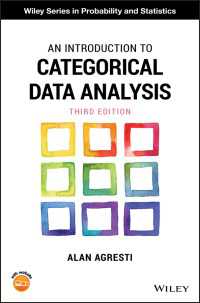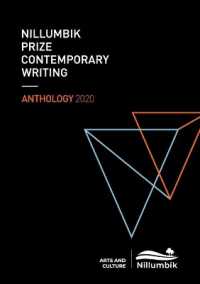- ホーム
- > 洋書
- > 英文書
- > Politics / International Relations
Full Description
Germany's unification in October 1990 was one of the most momentous events in modern European history and world politics since the end of World War II. German unity ended the Cold War in Europe, accelerated the collapse of communist regimes across Eastern Europe, and the disintegration of the USSR in 1991. It also triggered NATO's transformation at the London and Rome summits of the Alliance and deepened Europe's political and economic integration with the signing of the treaty of Maastricht in 1992. This book offers new insights into the role that the Anglo-American 'special relationship' played in this process, and examines the impact that Germany's reunification had on Anglo-American and transatlantic relations.
Contents
Part One: The 'Special Relationship'and the German question during the Cold War
1. The U.S., the UK, and the German question from the first Cold War to détente (1945-1961)1.1 The 'Special Relationship' and Germany from Potsdam to the Federal Republic's establishment 1.2 The Federal Republic's Western integration: the Anglo-American allies and German rearmament1.3 The 'Special Relationship' and Germany before and after the 1953 East German riots1.4 The 'Special Relationship' and Germany from 1955 to the second Berlin crisis
2. The U.S., the UK and the German question from détente to the second Cold War (1961-1985)2.1 The 'Special Relationship' and the Federal Republic's Ostpolitik (1961-1973)2.2 The 'Special Relationship', the GDR, and the CSCE2.3 The US, the UK, the German question and the second Cold War2.4 The 'Special Relationship' and the FRG in the early 1980s
3. The US, the UK and the German question at the Cold War's end (1985-1989)3.1 Anglo-American reactions to the prospect of change in Germany (1985-1988)3.2 The GDR's crisis, the fall of the Wall, and the Anglo-American schism3.3 US-West German convergence: Kohl's blueprint and Baker's response
Part Two: Anglo-American relations and the diplomacy of German unification (1989-1990)
4. The US, the UK, and German unification4.1 The 'Special Relationship' evaporates: Britain's search for a European bloc4.2 On the road to unification: 'Two plus Four' rather than 'Two plus Zero'4.3 The not so 'Special Relationship': Ottawa and US rejection of a strengthened CSCE role4.4 The issue of a peace settlement: Anglo-American differences of tone and substance
5. The US, the UK, and German unification within NATO5.1 Germany's relationship with NATO and Britain's alignment with US positions5.2 The US, Germany, and the Camp David summit5.3 Anglo-German tension and Thatcher's growing isolation5.4 The 'Special Relationship' and Germany's place in the Atlantic Alliance5.5 Anglo-American views about the Status of Forces Agreement (SOFA)
Conclusions: Still a 'Special Relationship' after Unification?
-

- 洋書電子書籍
- カテゴリカルデータ解析入門(第3版)<…
-

- 電子書籍
- 文豪ストレイドッグス×角川文庫 コラボ…






